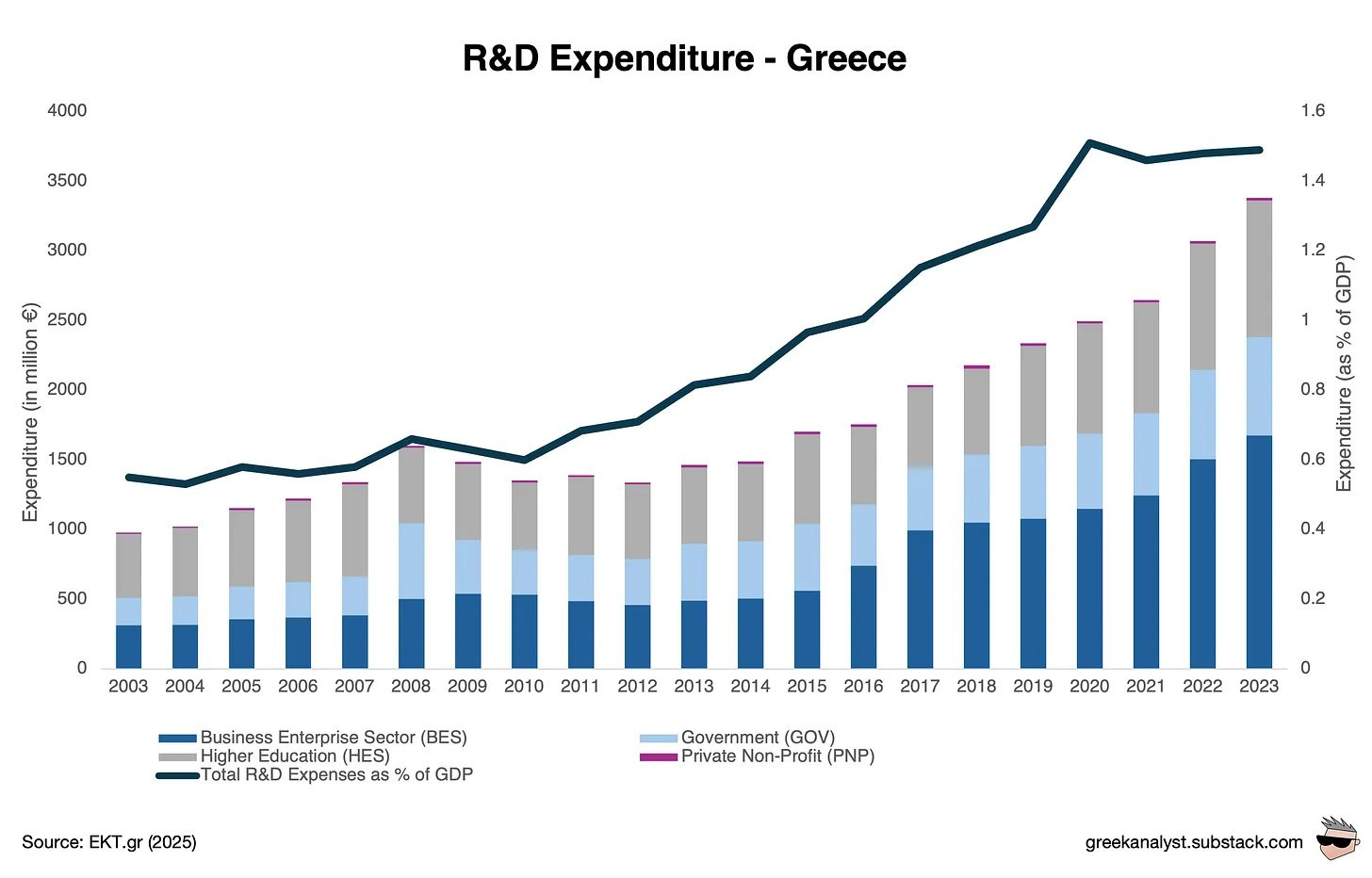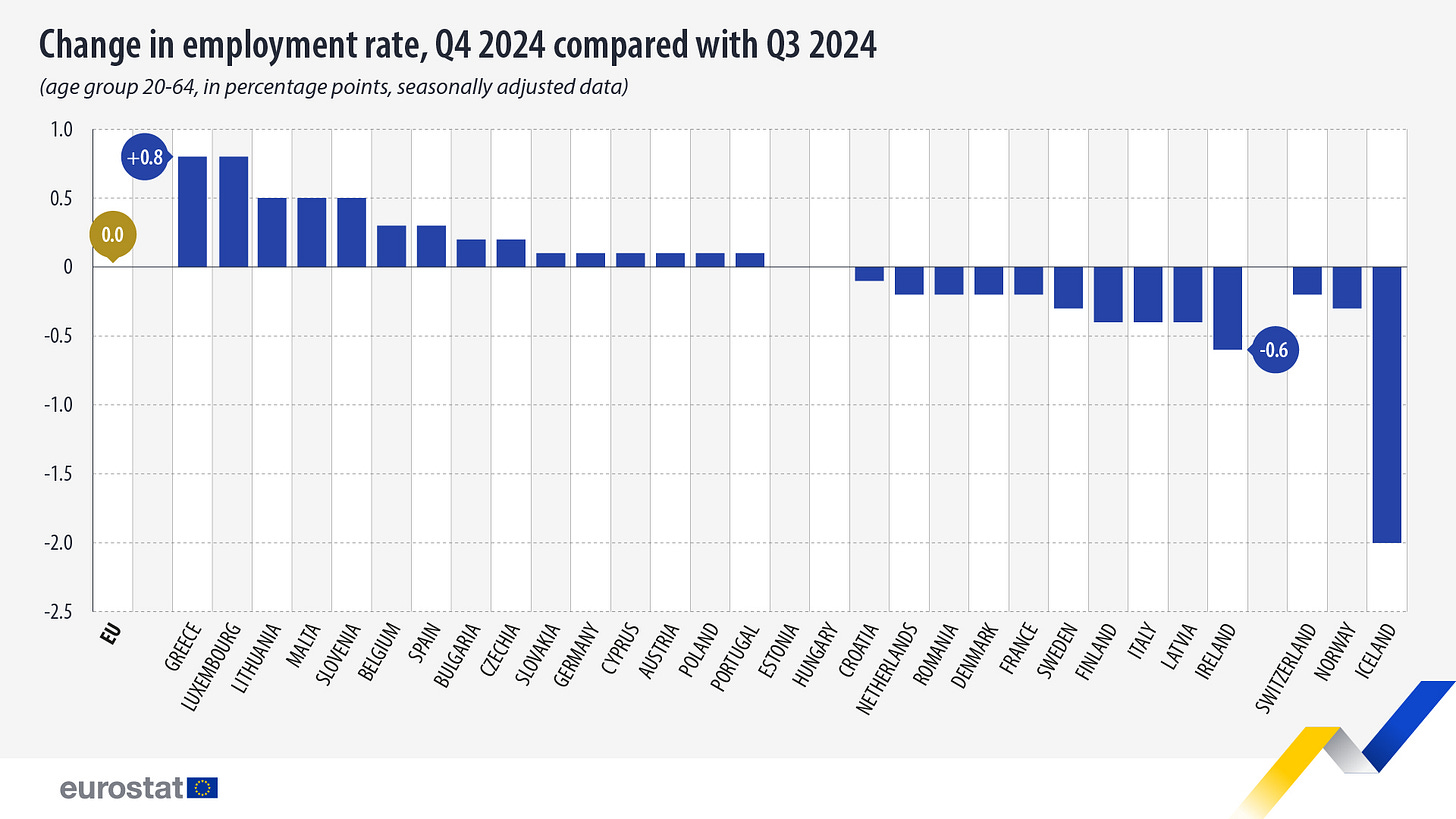Welcome to the 53 awesome new readers who joined us in the past week!
If you haven’t subscribed, join 3,400 smart, curious people interested in Changing Greece.
✉️🧑🔬 Message from a Greek scientist
Dear Greek Analyst,
I just read both parts of your Substack on EU dynamism [Part I, Part II], and I wanted to sincerely thank you for this. I admire how, despite the many challenges, you maintain a positive mindset- it’s truly inspiring. I also believe that with the right balance of optimism, hard work, and vision, Europe has the potential for a true renaissance. I’d love to discuss a more specific critical area where I see a major opportunity for Europe to regain competitiveness: academic research.
While often overlooked due to its lack of immediate financial returns, research and innovation are inextricably linked. Civilization itself has advanced through basic research- many of humanity’s greatest inventions stemmed from decades of scientific exploration. Even when research leads to negative results, it is essential to understanding what works and what doesn’t.
Right now, academic research in the U.S. is facing serious threats. One of the things I value most here is that institutions provide researchers with the necessary infrastructure- handling bureaucracy, maintaining core facilities- so scientists can focus on being their most creative selves. However, with recent cuts to indirect cost funding and increasing political hostility toward research, the quality of U.S. academic science is at risk. If this trend continues, many researchers, including Americans, will start seeking opportunities elsewhere.
This presents a huge opportunity for Europe. The U.S. National Institutes of Health (NIH) alone has an annual budget of ~$47B for biomedical research, while the EU’s entire 7-year Horizon Europe budget is €93.5B across all scientific fields. While national funding mechanisms exist too, they are often unreliable- especially in countries like Greece, where research grants lack predictable timelines and salaries are inconsistent. After World War II, the best scientific minds flocked to the U.S. because it massively funded research. Europe now has the chance to do the same: to invest strategically in science and attract top global talent.
Regarding Greece specifically, native scientists are among the best minds in the world. It is no coincidence that they excel internationally. I’ve experienced this firsthand. When I first came to the U.S., I lacked the background of my peers who had been groomed for scientific careers their whole lives. But through persistence, hard work, and the "street-fighting skills" I developed navigating the Greek academic system (as Dr. Konstantinos Daskalakis has cleverly put it), I’ve grown into a confident researcher with no limits on what I can achieve.
My dream is to return to Greece and work hard to make it a leading force in my field and not just a country that struggles to make ends meet. But real change requires systemic reform. Greek scientists around the world are eager to help shape a strategic research plan, but the government has failed to provide the necessary support, leading many to give up (see here).
I am currently in discussions with research institutions in Greece about returning as a faculty member. However, I’m facing several systemic challenges:
No startup funding: Unlike institutions worldwide, Greek research centers provide no initial funds to newly appointed faculty. Of course I anticipated this, so I plan to secure my own grants.
Lack of basic equipment: Some of the most fundamental machines for biomedical research are simply unavailable, making it impossible to work. I intend to overcome this too by leveraging collaborations within Greece and abroad and by applying for funding to purchase necessary equipment.
Unlivable salaries: As a newly appointed faculty (Researcher C' – Assistant Professor level), my net monthly salary would be just 1,200€. After years of rigorous training within Greece and abroad, sacrificing personal relationships and stability to gain expertise, I never expected to become rich- but at the very least, financial insecurity should not be a concern.
That said, I love Greece, and I truly believe in Greece’s potential, so I’m committed to overcoming these barriers. However, it is no surprise that so many scientists hesitate to come back under these conditions. If Greece truly wants to compete on the global stage, this conversation needs to happen now. I believe that voices like yours can help raise awareness, inspire solutions and drive meaningful change.
Thank you for taking the time to read all this - I didn’t expect it to be this long! I truly appreciate your insights and, more importantly, your optimistic voice in a world that too often leans toward cynicism and negativity.
Best,
Anonymous Greek Scientist
A few days ago, I received the above message.
The author (who shall remain anonymous) is a Greek scientist that works as a PostDoc researcher at one of world’s top universities in the United States.
I decided to share this message with everyone today because I believe it highlights key challenges and opportunities that exist on a pan-European but also national level.
Let’s go through them together.
Europe’s R&D funding gap: missing investment in science
If Europe wants to become more competitive, it must treat research not just as an academic pursuit performed in a vacuum, but as a high-return investment for society and economy at large. There is a lot of ground the EU needs to cover here.
Today, the EU is lagging behind many of its global competitors in terms of R&D investment: China, Japan, the United States as well as South Korea, all have a higher gross domestic expenditure on R&D as % of GDP.

The gap is real: the EU has been consistently missing its target of 3% of GDP per year in R&D investments, corresponding to a missing EUR 123 billion per year.

If we look at the distribution of nominal R&D investment, US companies consistently represent over 40% of total R&D investment. EU companies have fallen below 20%.
After the COVID era, US companies increased their share of the total to over 42%, driven mainly by large R&D investments in the ICT and health sectors.
In fact, funding for disruptive innovation in the EU is only a fraction of that in the US.

More funding on R&D is essential. But so is the reduction of bureaucratic barriers, a higher commitment to long-term oriented research and a stronger relationship between homegrown innovators and European industry. Otherwise, Europe will continue hemorrhaging talent to countries willing to invest more aggressively and provide more opportunities to cutting edge scientists.
A window of opportunity for Europe
For decades, the United States has been the undisputed leader in scientific research. Thanks to its massive investment in infrastructure and funding (particularly after World War II, with DARPA and other state funded projects), the United States consistently attracted some of the brightest minds around the globe.
But cracks are now starting to show. The new U.S. administration has followed a strategy of drastically slashing federal funding for America’s higher education institutions. I personally believe that this is a very misguided way to address real and existing problems in U.S. academia, and it could be a massive setback for the long-standing supremacy of the United States in academic research.
These funding cuts are only the tip of the iceberg. A heightened level of ideology-driven research, decades of increased bureaucracy and open hostility toward science have put the once unquestionable primacy of U.S. research at risk. If these trends continue, many scientists (Europeans, Americans, but also from other nationalities) currently based in the United States will start seeking opportunities elsewhere.
This presents a unique opportunity for Europe. By making research a strategic priority, European institutions could attract world-class scientists who are looking for stable, well-funded environments to conduct their groundbreaking work.
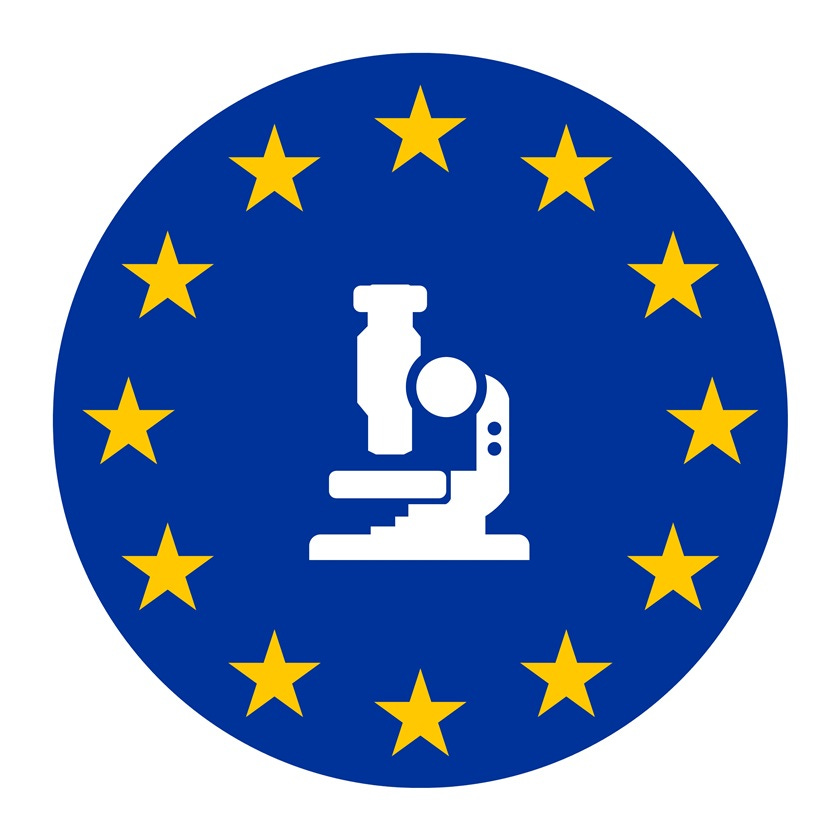
What does that mean concretely for the European Union? Here are some ideas:
Bringing the relatively unknown concept of the European Research Area (ERA) — single, borderless market for research, innovation and technology across the EU — a much more prominent concept.
Direct Horizon Europe funds towards Europe’s urgent technology needs rather than fancy sustainability projects (often of questionable value).
Increase funding for the European Research Council (ERC).
Provide much stronger tax incentives for companies to invest in R&D and partner with EU-based scientists.
Build (finally) the European DARPA.
Greece’s untapped potential (currently being wasted)
Greece has given birth to amazingly talented scientists.
I have written about it in the past. But you don’t have to take my word for it.
This is proven year after year in many lists of top scientists, showing how impressive and multi-domain the Greek research community is, both in and outside of Greece.
So much so that even random people are asking about it on the internet.

The bad news?
Greece is a peculiar outlier: we have the worst labour productivity in the developed world and one of the lowest levels of R&D intensity.

Salaries for academics and researchers are depressingly low across all levels.

Greece has also been utterly unable to effectively tap into into the EIC Acceletaror programme funds for startups, spin-offs and early stage research since 2021 (this is part of the famous Horizon Europe awards).
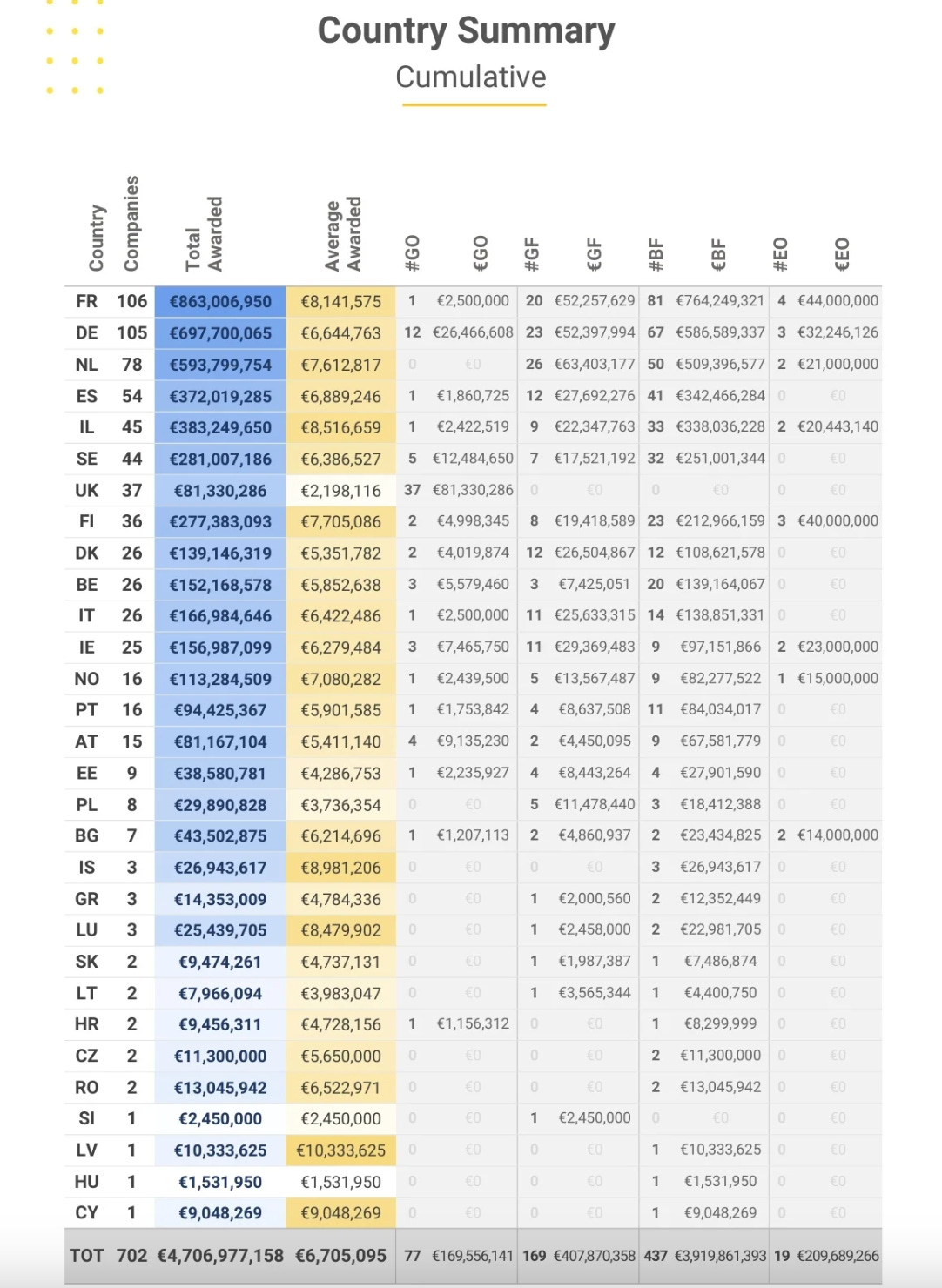
In the past four years, only 3 companies in Greece received just shy over €14 million. Compare that to Spain, which had 54 companies winning over €372 million. Or Portugal, with 15 companies being awarded €94 million. Or even Bulgaria, which had 7 companies receiving more than €43 million. Greece’s performance is abysmal.
The recent wave of resignations from the National Research Council is also a cause for alarm. The lack of strategic focus and the continuous infighting seems to have negated the great work that this institution could be playing in Greek science today.
The good news?
Greece seems to have finally understood the importance of R&D.
Between 2013 and 2023, R&D expenditure in Greece increased from €1.5 to €3.4 billion — an increase of almost 2.3x. At the same time, total R&D expenses as % of GDP have risen from 0.8% to 1.5%.
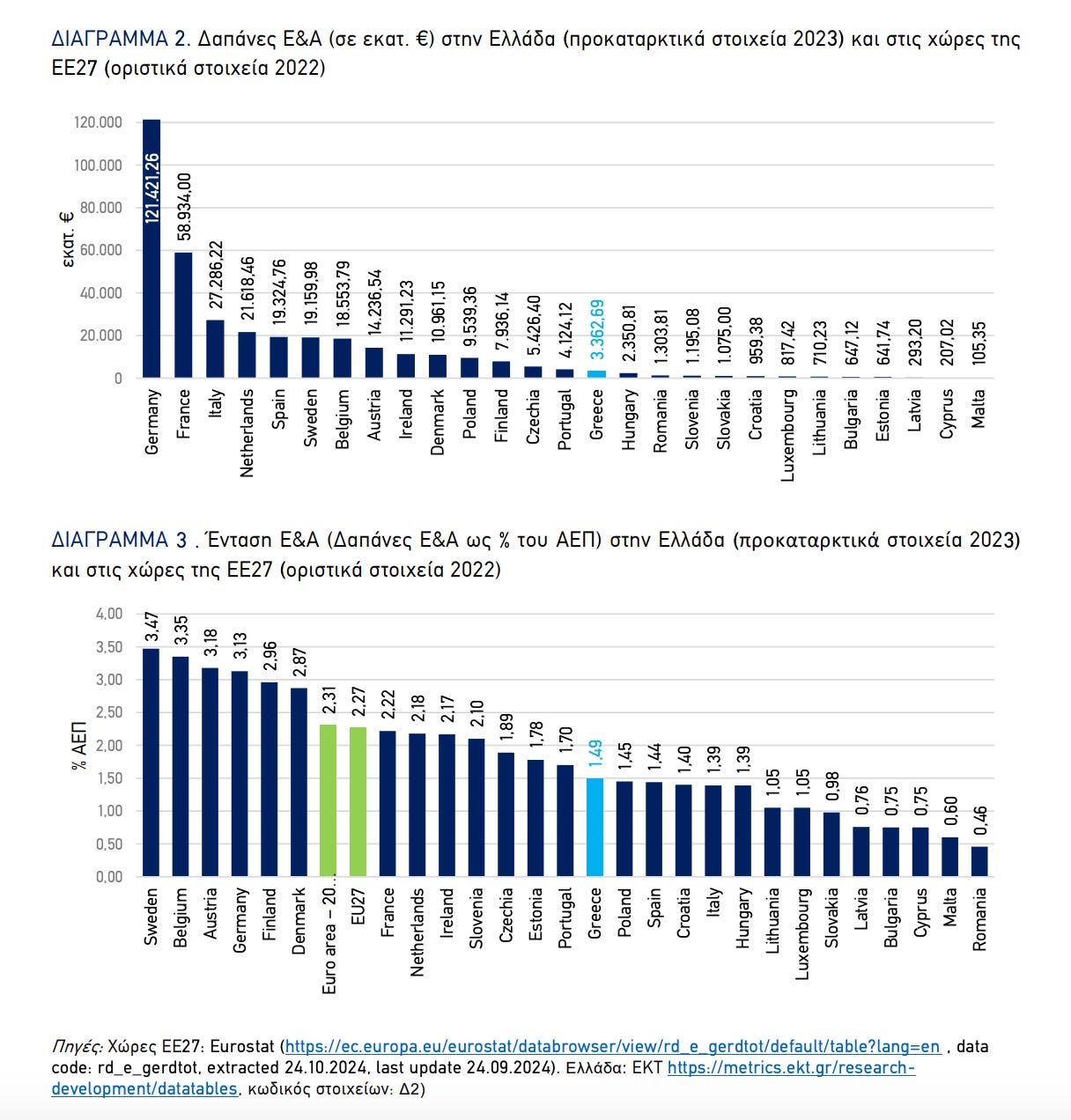
If we look at how we compare with the rest of Europe, we are around the median both in terms of total R&D funding in euro terms (first chart) as well as R&D as % of GDP. However, we are sadly quite below the average in both cases.
Finally, it has been very fortunate to see the government introduce new tax incentives for R&D, allowing for up to 315% of a Greek company’s investment into R&D to be tax deductible as an expense.
Turning brain drain into brain gain
Greece has certainly made some progress, but it’s nowhere near enough yet.
The country will need to do much more than simply depend on the nice weather to retain its local talent and attract back a part of the people that have already left.
Increasing research funding closer to EU average, improving salaries for academics, cutting bureaucratic red tape for research grants, providing more incentives for R&D, and supporting innovators to access EU funds more easily should all be top priorities.
Beyond that, Greece must create an environment where innovation is not just encouraged, but actually becomes a core part of how it operates on every level.
🏭 Economy & Business
Greece scores highest employment gains across EU in Q4 2024
1,200+ foreign millionaires moved to Greece during 2022-2024
36,000 public properties to be mapped and valued for development
Gross Fixed Capital Formation reaches 16.7% of GDP, a 14-year high
Evolution of turnover of enterprises shows best January in 6 years
JP Morgan remains positive about the Greek market in 2025
Qualco weighs IPO to expand across Europe and the Middle East
4.7 GW utility-scale battery storage program to be launched
New sizable tax cuts are being prepared by the Greek government
2023 annual report for the private insurance market in Greece was released by the Hellenic Association of Insurance Companies - very juicy report
🤖 Tech & Startups

Greeks in AI 2025 symposium will takes place this coming July
Defense as the vehicle of Greece’s industrial rebirth, says Panos Papadopoulos
TurinTech (AI coding) announced a new product and $20M in total funding
expand.network (DeFi infrastructure) to be acquired by Blockdaemon
Lastmily (e-commerce delivery) raised €1 million in funding from Uni.fund
Plum’s (fintech) valuation surpasses €200M after latest funding round
Wolt has increased revenues by 58% in 2023, reducing efood’s dominance
merokam is a new platform connecting agricultural businesses with workers
snappi, the Greek neobank, is opening up a waitlist for early users
🙌 Celebrating Greek wins
Stavros Papoutsis is part-time owner of the legendary pastry shop Χαρά in Athens and part-time greatest viral icon of the year
Aristotle Racing Team comes 2nd in the global Formula Student championship, jumping to 23rd world ranking and 3rd best European one among 420 universities
Kyriakos Vamvoudakis (Georgia Tech) is member of the team that won a $6.7M NASA ULI grant to create intelligent systems for Advanced Air Mobility (AAM)
Angelos Pistofidis (now at MIT) reveals how life-saving molecules are created and helps usher an age of next-generation therapeutics
📊 Chart of the week: Greek dependence on US defense armaments decreasing?
One of the most surprising statistics of the past years for me is the decreasing reliance of Greece’s dependence on US-supplied military armaments.
While most European countries in NATO have increased their reliance, Greece is now near the bottom of the graph (around 20% of arm procurement coming from the US).
📚 If you enjoyed this post, you might also like
That’s it for today! If you enjoyed today’s newsletter, please let me know with a like or reply. And if you value the content shared here every week, consider pledging your support. Thanks.





